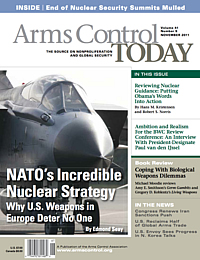New Article On Obama Administration Nuclear Targeting Review
 |
| New article published in Arms Control Today |
.
By Hans M. Kristensen
The latest issue of Arms Control Today includes a new article by Robert Norris and myself about the nuclear targeting review that is currently underway in the Obama administration.
In ordering the review, formally known as the Post-NPR Review, President Obama has asked the military to review and revise U.S. nuclear strategy and guidance on the roles and missions of nuclear weapons, including potential changes in targeting requirements and alert postures, in preparation for the next round of nuclear reductions beyond the New START treaty with Russia.
Our article describes the bureaucratic labyrinth the review will go through before new presidential guidance emerges to change the U.S. nuclear war plan. To that end, we offer a wide range of suggestions for how the review could reduce the requirements for U.S. nuclear forces to “put an end to Cold War thinking,” as President Obama said in his Prague speech in 2009.
Note: accessing the article requires subscription to Arms Control Today.
Further information: Obama and the Nuclear War Plan (FAS, 2010).
This publication was made possible by a grant from Carnegie Corporation of New York and Ploughshares Fund. The statements made and views expressed are solely the responsibility of the author.
The last remaining agreement limiting U.S. and Russian nuclear weapons has now expired. For the first time since 1972, there is no treaty-bound cap on strategic nuclear weapons.
The Pentagon’s new report provides additional context and useful perspectives on events in China that took place over the past year.
Successful NC3 modernization must do more than update hardware and software: it must integrate emerging technologies in ways that enhance resilience, ensure meaningful human control, and preserve strategic stability.
The FY2026 National Defense Authorization Act (NDAA) paints a picture of a Congress that is working to both protect and accelerate nuclear modernization programs while simultaneously lacking trust in the Pentagon and the Department of Energy to execute them.